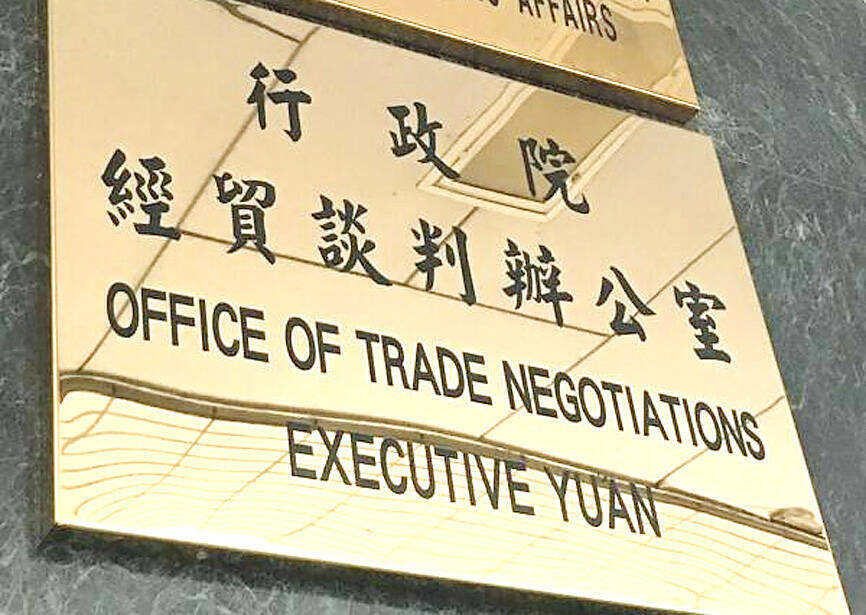Taiwan would push to join the Comprehensive and Progressive Agreement for Trans-Pacific Partnership (CPTPP) during the APEC meeting in Lima, the nation’s top trade negotiator, Yang Jen-ni (楊珍妮), said on Sunday.
Yang, who is part of the Taiwanese delegation and heads the Executive Yuan’s Office of Trade Negotiations, said on the sidelines of the Peru meeting that the event is a great opportunity for Taiwan to pitch to join the CPTPP and demonstrate its high standards of trade.
Taiwan is fully prepared to work with the CPTPP members in pursuing a green economy, inclusive growth and digital economic transformation, she said.

Photo courtesy of the Executive Yuan
The nation will ramp up exchanges in industrial development, technologies and talent with CPTPP members as it paves the way to join the trade bloc, she said.
The CPTPP, which evolved from the Trans-Pacific Partnership that the US left in January 2017, is one of the world’s biggest trade blocs. It represents a market of 500 million people and accounts for 13.5 percent of global trade.
Its 11 signatories are Australia, Brunei, Canada, Chile, Japan, Malaysia, Mexico, New Zealand, Peru, Singapore and Vietnam.
The UK formally signed the trade agreement on July 16 last year. The British government expects its agreement to join the CPTPP to enter into force by Dec. 15.
Taiwan officially applied to join the CPTPP on Sept. 22, 2021, less than a week after China. Ecuador, Costa Rica, Uruguay and Ukraine have also applied to join the trade bloc.
According to the CPTPP’s Auckland Principles, the group is open to accession by any economy that is willing and able to meet the CPTPP’s high standards, has a demonstrated history of compliance with their existing trade commitments and can achieve the consensus of CPTPP parties.
Yang said Taiwan would likely face uncertainty in its trade relationship with the US, given US president-elect Donald Trump, whose rhetoric implies he opposes global trade, won the US elections on Tuesday last week.
Taiwan and the US have been in close communication over the first agreement in the US-Taiwan Initiative on 21st-Century Trade, Yang’s office said earlier this month.
The deal was signed by both sides in June last year.
In Taipei, Lin Hsin-i (林信義), Taiwan’s envoy to APEC, is scheduled to depart for Lima tomorrow to attend the leaders’ summit on Thursday.
Lin, who is to represent President William Lai (賴清德) at the summit, said at a news conference on Thursday last week that he would express Taiwan’s willingness to contribute to peace in the Asia-Pacific region and demonstrate the country is a reliable and responsible member of the international community.
Lin previously attended three APEC meetings: Brunei in 2000, China in 2001 and South Korea in 2005, during the Democratic Progressive Party administration of then-president Chen Shui-bian (陳水扁).
Lin, chairman of Taiwania Capital Management Corp and a senior presidential adviser, served as economic affairs minister from 2000 to 2002 and vice premier from 2002 to 2004.
Taiwan joined APEC in 1991 under the name “Chinese Taipei.” However, China has blocked the nation’s presidents from attending the leaders’ summit.
This year’s meeting in Lima is following the theme “Empower, Include, Grow.”

Chinese Nationalist Party (KMT) Chairman Eric Chu (朱立倫), spokeswoman Yang Chih-yu (楊智伃) and Legislator Hsieh Lung-chieh (謝龍介) would be summoned by police for questioning for leading an illegal assembly on Thursday evening last week, Minister of the Interior Liu Shyh-fang (劉世芳) said today. The three KMT officials led an assembly outside the Taipei City Prosecutors’ Office, a restricted area where public assembly is not allowed, protesting the questioning of several KMT staff and searches of KMT headquarters and offices in a recall petition forgery case. Chu, Yang and Hsieh are all suspected of contravening the Assembly and Parade Act (集會遊行法) by holding

PRAISE: Japanese visitor Takashi Kubota said the Taiwanese temple architecture images showcased in the AI Art Gallery were the most impressive displays he saw Taiwan does not have an official pavilion at the World Expo in Osaka, Japan, because of its diplomatic predicament, but the government-backed Tech World pavilion is drawing interest with its unique recreations of works by Taiwanese artists. The pavilion features an artificial intelligence (AI)-based art gallery showcasing works of famous Taiwanese artists from the Japanese colonial period using innovative technologies. Among its main simulated displays are Eastern gouache paintings by Chen Chin (陳進), Lin Yu-shan (林玉山) and Kuo Hsueh-hu (郭雪湖), who were the three young Taiwanese painters selected for the East Asian Painting exhibition in 1927. Gouache is a water-based

Taiwan would welcome the return of Honduras as a diplomatic ally if its next president decides to make such a move, Minister of Foreign Affairs Lin Chia-lung (林佳龍) said yesterday. “Of course, we would welcome Honduras if they want to restore diplomatic ties with Taiwan after their elections,” Lin said at a meeting of the legislature’s Foreign Affairs and National Defense Committee, when asked to comment on statements made by two of the three Honduran presidential candidates during the presidential campaign in the Central American country. Taiwan is paying close attention to the region as a whole in the wake of a

OFF-TARGET: More than 30,000 participants were expected to take part in the Games next month, but only 6,550 foreign and 19,400 Taiwanese athletes have registered Taipei city councilors yesterday blasted the organizers of next month’s World Masters Games over sudden timetable and venue changes, which they said have caused thousands of participants to back out of the international sporting event, among other organizational issues. They also cited visa delays and political interference by China as reasons many foreign athletes are requesting refunds for the event, to be held from May 17 to 30. Jointly organized by the Taipei and New Taipei City governments, the games have been rocked by numerous controversies since preparations began in 2020. Taipei City Councilor Lin Yen-feng (林延鳳) said yesterday that new measures by